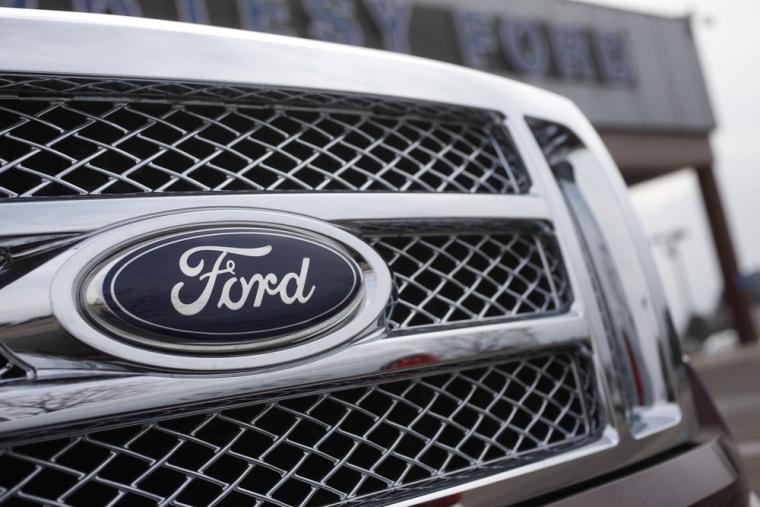After a struggle that began nearly a third of a century ago, Detroit's auto quality has finally caught up with the Japanese — or so one might believe based on the latest Initial Quality Study from the influential market research firm J.D. Power and Associates.
The good news for domestic automakers, especially Ford, could spell trouble for Toyota, which made its reputation over the past two decades by consistently topping the quality list. What the IQS giveth, it may also taketh away.
Motown’s Big Three began to see their dominance of the domestic market erode in the mid-1970s, when the nation was hit by the first Mideast oil shock. But even as General Motors, Ford and Chrysler began chasing their import rivals on the fuel economy charts, the Asian emphasis was shifting. As long gas lines faded from the collective consumer memory, motorists were won over by the quality advantages of the Japanese.
And 24 years ago, Power quantified the quality gap with the first Initial Quality Study, or IQS, which found that the typical product rolling off a Detroit assembly line had up to twice the “problems” of a comparable Asian model, at least one built by top-tier makers such as Toyota and Honda.
Over the decades, the Big Three have struggled to match the industry average, never mind land in the Top 10 on the IQS chart. But in recent years, there have been some surprises delivered by the annual study.
Hyundai, a Korean carmaker long known for making low-cost, but problem-plagued econoboxes, not only started moving upscale with its offerings, but also steadily up the IQS ladder.
This year, Hyundai landed in the seventh spot among the 33 brands covered by the Power study. But that was two positions behind the Ford brand which became the first mainstream Detroit brand to make it into the IQS Top 5, while its luxury brand, Lincoln, was ninth and its long-time Swedish subsidiary, the recently sold Volvo, rounded out the Top 10.
Ford’s strong performance carried the day for the domestics overall for the first time ever, topping the imports in the number of problems per 100 vehicles.
To be sure, the gap was small, 108 for the Big Three, and 109 for the imports, but it’s a breakthrough nonetheless, insisted David Sargent, Power’s chief of global automotive research.
“This year may mark a key turning point for U.S. brands as they continue to fight the battle against lingering negative perceptions of their quality,” he said.
There’s still a big gap between Detroit’s best and its also-rans; not a single GM or Chrysler product made it into the Top 10.
The smaller maker’s new Ram truck division was just one point out, however, and Chrysler, persistently struggling to deal with endemic quality issues, is finally showing some upward momentum, according to Sargent. So is GM, he suggested, despite some trouble with the launch of some of its newest products, like the Chevrolet Camaro.
If any brand needs to worry, Power data points to Toyota. It can be argued that the IQS made the Japanese maker, underscoring the superiority of its products, at least on a quality basis. The question the 2010 study raises is whether Toyota is really seeing its quality stumble or just feeling the impact of its ongoing safety crisis.
The latest IQS surveyed owners about the same time the Japanese giant began recalling millions of cars, trucks and crossovers, stressed spokesman Curt McAllister, most for problems related to so-called unintended acceleration.
Significantly, the maker’s Lexus brand still came in fourth on the 2010 IQS and had the single-best model in the entire survey, the flagship LS sedan recording just 55 problems per 100 vehicles.
On the other hand, Sargent not so subtly hinted, the scandal may have convinced owners to take a closer look at their Toyota products, perhaps to discover that despite its long-standing reputation, there could be quality issues that shouldn’t be ignored.
Some of that concern may be showing up in sales. Ford, GM and Chrysler all reported strong sales gains in May over the same month a year ago. Many other Asian brands and European automakers also posted big increases. Toyota's sales rose only 7 percent, however, despite some of the maker's most lavish incentives ever.
There's been a long-running debate about the IQS methodology, however. When Power first started the survey, it wasn’t uncommon for each vehicle to have three, four, even five problems. And, in those days, that meant an actual defect, anything from a burned-out bulb to a defective transmission.
Such problems have been rapidly vanishing as the industry embraces a variety of assembly line control methods. Some years back, Power rejiggered the IQS metrics to also include designed-in problems, such as the lack of cupholders or a difficult-to-use navigation system.
Critics contend such issues shouldn’t be weighed as heavily as serious mechanical failures. And they note that the absence of efficient cupholders have often been the reason why German brands will dip below average, while Mini’s pint-sized offerings have suffered for having a small trunk.
Sargent counters that you can fix a transmission, but there’s not much you can do with a badly designed interior or a balky infotainment system.
Whatever the merits of the IQS methodology, the study has an oversize influence on public perception. The Power study has given Toyota credibility. Will it now take that away?
The question can be reversed for Ford and its cross-town rivals. Detroit’s quality turnaround hasn’t occurred overnight, Sargent stresses. It has been steadily gaining ground in recent years, but “perception lags reality.”
But will it ever catch up? Even if Toyota experiences only a temporary setback, as many anticipate, the results of the 2010 IQS provide a rare opportunity for the Big Three to reach out to motorists who had long written off the domestic brands.
